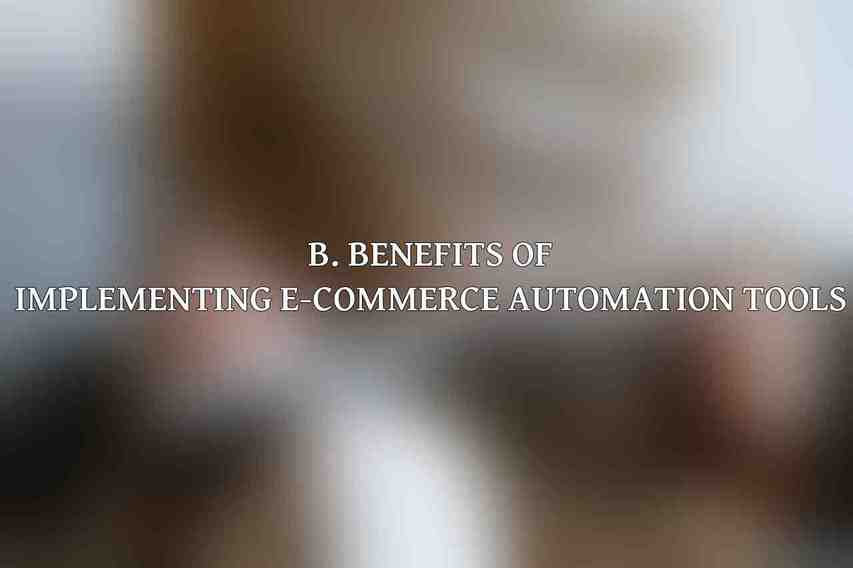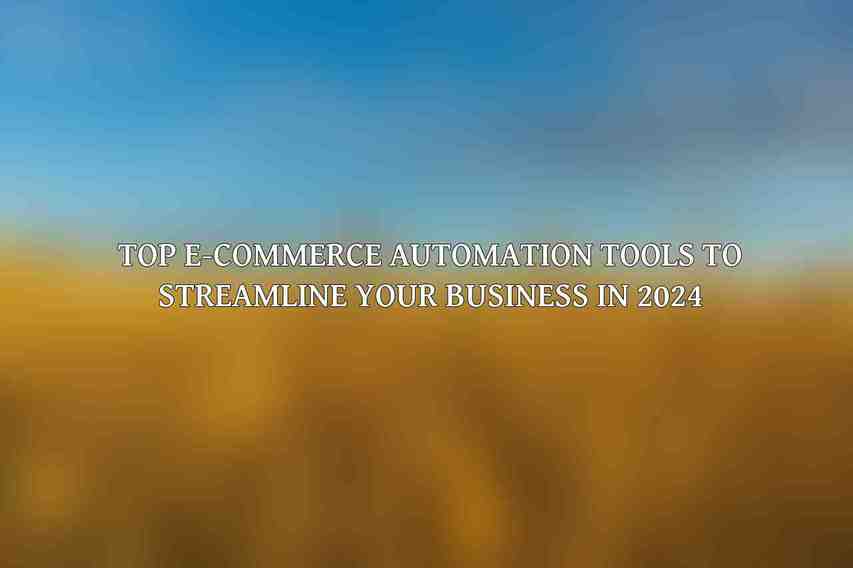automation plays a vital role in streamlining processes, increasing efficiency, and enhancing customer experience. E-commerce automation refers to the use of technology to automate tasks and workflows in online retail operations. This automation can range from marketing and outreach to inventory management, order fulfillment, customer relationship management (CRM), and business intelligence. The significance of e-commerce automation lies in its ability to save time, reduce errors, improve scalability, and ultimately drive business growth.
A. Definition and Significance of E-commerce Automation
E-commerce automation involves the use of software and tools to automate repetitive tasks and processes in online retail operations. These tasks can include email marketing, inventory management, order processing, customer support, and data analysis. The significance of e-commerce automation lies in its capacity to streamline operations, improve efficiency, and enhance the overall customer experience. By automating routine tasks, businesses can focus on strategic decision-making and growth opportunities.
B. Benefits of Implementing E-commerce Automation Tools

The benefits of implementing e-commerce automation tools are vast and impactful for businesses:- Increased Efficiency: Automation reduces manual workloads and speeds up processes.- Improved Accuracy: Automation minimizes human errors, leading to more reliable outcomes.- Enhanced Customer Experience: Automation allows for personalized and timely interactions with customers.- Cost Savings: Automation can reduce operational costs and optimize resource utilization.- Scalability: Automated processes can easily adapt to the changing needs of a growing business.
C. Latest Advancements and Trends in the Industry

In 2024, the e-commerce automation industry continues to evolve rapidly with several notable advancements and trends:- AI and Machine Learning: Integration of AI and machine learning algorithms for personalized customer experiences and predictive analytics.- Multi-Channel Integration: Tools that facilitate seamless integration across various sales channels such as social media platforms and marketplaces.- Mobile Optimization: Focus on mobile-first automation tools to cater to the increasing trend of mobile shopping.- Enhanced Security: Automation tools with advanced security features to protect sensitive customer data and transactions.- Real-Time Analytics: Emphasis on real-time data analytics and reporting for immediate decision-making and optimization. Learn more about Maximizing E-Commerce Efficiency: Automating Checkout with ClickFunnels
Top E-commerce Automation Tools
A. Marketing and Outreach
- Klaviyo: Klaviyo is a powerful email marketing automation platform that offers advanced segmentation, personalization, and analytics capabilities. It helps businesses create targeted campaigns for different customer segments.
- Mailchimp: Mailchimp is an all-in-one marketing platform that includes email marketing, social media management, and website building tools. It enables businesses to reach customers through multiple channels.
- HubSpot: HubSpot provides a comprehensive suite for marketing, sales, and customer service automation with CRM integration, workflow automation, and detailed analytics.
- Omnisend: Omnisend is a multi-channel marketing automation platform specializing in email, SMS, social media, and push notifications to engage customers across various touchpoints.
B. Inventory Management
- Zoho Inventory: Zoho Inventory is a cloud-based solution offering multi-warehouse support, barcode scanning, order fulfillment management, and real-time inventory tracking.
- Fishbowl: Fishbowl is a desktop-based inventory management system known for its robust reporting, customization options, and seamless integration capabilities with other software.
- QuickBooks Commerce: QuickBooks Commerce combines inventory and order management features with financial tools to provide a complete solution for e-commerce businesses.
- TradeGecko: TradeGecko is an inventory optimization tool that includes demand forecasting, order suggestions, supplier management, and inventory tracking functionalities.
C. Order Fulfillment
- ShipStation: ShipStation simplifies shipping and order fulfillment processes with automated order processing, label printing, carrier selection, and tracking services.
- Ordoro: Ordoro is a cloud-based order management platform that offers inventory tracking, multi-carrier shipping options, and optimization tools for efficient fulfillment.
- ShipBob: ShipBob operates a fulfillment network with storage, packing, and shipping services across multiple locations in the US and Europe, providing fast and reliable order fulfillment.
- Shopify Fulfillment Network: The Shopify Fulfillment Network offers businesses access to a network of fulfillment centers, automated order processing, real-time inventory updates, and discounted shipping rates.
D. Customer Relationship Management (CRM)
- Salesforce Commerce Cloud: Salesforce Commerce Cloud is a comprehensive CRM solution tailored for e-commerce businesses, featuring customer profiles, personalized experiences, and AI-driven insights.
- Zendesk Sell: Zendesk Sell is a CRM designed for small businesses, offering lead management, customer profiles, automation workflows, and seamless integration with other platforms.
- Zoho CRM: Zoho CRM is a cloud-based customer relationship management tool with modules for sales, marketing, and customer support, tailored to streamline customer interactions.
- Freshworks CRM: Freshworks CRM is an all-in-one CRM platform with features like customer profiles, automated workflows, multi-channel communication, and sales automation tools.
E. Business Intelligence and Analytics
- Google Analytics: Google Analytics is a free web analytics tool that provides insights into website traffic, user behavior, conversions, and audience demographics for data-driven decision-making.
- Adobe Analytics: Adobe Analytics offers advanced analytics features such as customer segmentation, predictive modeling, and AI-driven insights to optimize marketing strategies.
- Kissmetrics: Kissmetrics is a behavioral analytics tool that focuses on user segment analysis, customer journey mapping, and revenue optimization strategies to enhance marketing effectiveness.
- Mixpanel: Mixpanel is a product analytics platform that specializes in real-time behavioral tracking, funnel analysis, and feature adoption insights to drive product development and user engagement.
Factors to Consider When Choosing an E-commerce Automation Tool
A. Business Size and Industry
The size of the business and the industry it operates in can influence the choice of automation tools. Small businesses may require simpler solutions, while large enterprises may need more robust and scalable options tailored to their specific industry needs.
B. Budget and Cost-Effectiveness
Consideration of the budget allocated for automation tools is crucial. Evaluate the cost-effectiveness of the tools in terms of the value they provide versus their price, and choose tools that align with the budget constraints of the business. You can find more information on Understanding the Costs and ROI of Implementing E-commerce Automation
C. Features and Functionality
Assess the features and functionalities offered by automation tools and match them with the specific requirements of the business. Look for tools that have the necessary capabilities to streamline processes and meet business objectives.
D. Integrations and Compatibility
Check the compatibility of automation tools with existing systems and software used in the business. Seamless integration with e-commerce platforms, CRMs, accounting software, and other tools is essential for a smooth workflow.
E. Customer Support and Documentation
Good customer support and comprehensive documentation are vital when choosing automation tools. Look for providers that offer reliable support services, training resources, and detailed documentation to assist with the setup and ongoing use of the tools.
Tips for Implementing E-commerce Automation
A. Define Clear Goals and Objectives
Clearly define the goals and objectives that the business aims to achieve through e-commerce automation. Establish key performance indicators (KPIs) to measure the success of automation strategies. Check this blog on Elevating Your Multi-Channel E-Commerce Strategy with ClickFunnels Automation
B. Choose the Right Tools for Your Business
Select automation tools that align with the unique needs and processes of the business. Consider factors such as scalability, ease of integration, and the ability to customize the tools to suit specific requirements.
C. Gradually Implement and Test Tools
Implement automation tools gradually to ensure a smooth transition and minimize disruptions. Test the functionality of the tools in real-world scenarios before full deployment to identify and address any issues. Find more on Boosting E-Commerce Customer Engagement through ClickFunnels Automation
D. Monitor and Adjust Automation Strategies
Regularly monitor the performance of automation strategies and tools to track their effectiveness. Analyze data insights and feedback to make informed adjustments and optimizations for better results.
E. Seek Professional Guidance If Needed
If navigating the world of e-commerce automation seems daunting, consider seeking professional guidance from consultants or experts in the field. Their expertise can help streamline the automation implementation process and maximize its benefits for the business.
A. Summary of the Key E-commerce Automation Tools
the top e-commerce automation tools in 2024 cover various aspects of online retail operations, from marketing and inventory management to order fulfillment, CRM, and business intelligence. Each tool offers unique features and functionalities to streamline processes and enhance the efficiency of e-commerce businesses. Check this blog on How ClickFunnels Can Revolutionize Your E-commerce Product Sales Process
B. Importance of Choosing the Right Tools for Business Growth
Choosing the right e-commerce automation tools is essential for driving business growth, improving operational efficiency, and staying competitive in the evolving e-commerce world. By selecting tools that align with business objectives and strategies, organizations can unlock new opportunities for expansion and success.
C. Outlook for the Future of E-commerce Automation
As technology continues to advance, the future of e-commerce automation holds even more promise. With innovations like AI, machine learning, and real-time analytics shaping the industry, businesses can expect more sophisticated automation tools that offer increased personalization, efficiency, and scalability. Embracing these advancements will be key to staying ahead in the dynamic world of online retail. Read more about this on Inventory Management Made Easy with ClickFunnels Automation for E-Commerce
By leveraging the top e-commerce automation tools and adopting best practices for implementation, businesses can optimize their operations, drive growth, and deliver exceptional experiences to their customers in 2024 and beyond.
Frequently Asked Questions
What are e-commerce automation tools?
E-commerce automation tools are software programs or platforms designed to streamline and automate various tasks in an online retail business, such as inventory management, order processing, and customer support.
How can e-commerce automation tools benefit my business?
E-commerce automation tools can help improve efficiency, reduce errors, save time, and ultimately increase productivity and profitability in your online retail business.
What are some popular e-commerce automation tools for 2024?
Some of the top e-commerce automation tools for 2024 include Shopify Flow, Klaviyo, Re:amaze, Zenstores, and ShipStation, among others.
How do I choose the right e-commerce automation tools for my business?
When choosing e-commerce automation tools for your business, consider factors such as your business needs, budget, integration capabilities, scalability, and customer support options.
Are e-commerce automation tools easy to integrate with existing e-commerce platforms?
Most e-commerce automation tools are designed to seamlessly integrate with popular e-commerce platforms like Shopify, WooCommerce, Magento, and BigCommerce, making the setup process relatively straightforward for most businesses.

